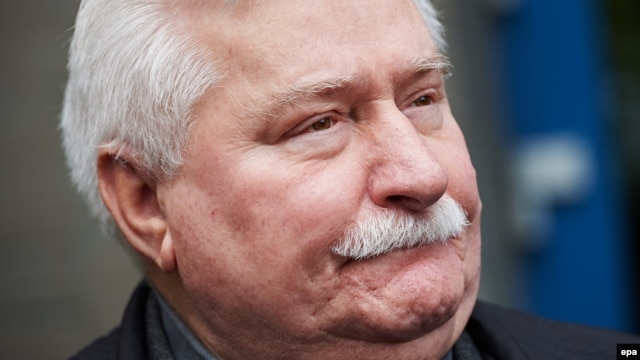Poland: Walesa rejects latest collaborator charge amid political feud
| Publisher | Radio Free Europe/Radio Liberty |
| Publication Date | 18 February 2016 |
| Cite as | Radio Free Europe/Radio Liberty, Poland: Walesa rejects latest collaborator charge amid political feud, 18 February 2016, available at: https://www.refworld.org/docid/570cdf1b2e.html [accessed 22 May 2023] |
| Disclaimer | This is not a UNHCR publication. UNHCR is not responsible for, nor does it necessarily endorse, its content. Any views expressed are solely those of the author or publisher and do not necessarily reflect those of UNHCR, the United Nations or its Member States. |
Last updated (GMT/UTC): 18.02.2016 18:15
By Pete Baumgartner
 Lech Walesa, 72, has previously acknowledged signing a commitment to be an informant, but has insisted he never acted on it. (file photo)
Lech Walesa, 72, has previously acknowledged signing a commitment to be an informant, but has insisted he never acted on it. (file photo)
Iconic former Polish President and Solidarity founder Lech Walesa has rejected fresh reports that revive allegations he was a paid informant for the communist-era secret services in a scandal that some say is politically motivated.
Documents released by Poland's Institute of National Remembrance on February 18 purportedly show receipts signed by Walesa for payments he received for giving information to the country's notorious SB state security service from 1970-76.
Walesa, whose 1980s struggle as a trade-union leader against Poland's communist government led to its downfall and democratic elections, said on social media that he will prove in court that "there can exist no [such] documents coming from me."
The documents were seized this week from the home of General Czeslaw Kiszczak, Poland's last Communist Party interior minister, who died in November.
Walesa, who served as Poland's first postcommunist president from 1990-95, has admitted to signing a document to be an SB informant but insisted he never worked for them afterward.
A special court in 2000 declared that it found no evidence of Walesa having collaborated with the security service, who reportedly gave him the code name "Borek."
The Institute of National Remembrance is close to the ruling Law and Justice party (PiS), which is led by former Prime Minister Jaroslaw Kaczynski – who is also seen as the gray eminence behind the current Polish government.
A former Solidarity member and close associate of Walesa, Kaczynski has been at odds with the Nobel laureate for many years stemming from political disagreements and personal rows.
In December, Walesa was sharply critical of Kaczynski and his nationalist PiS, which he accused of undermining democracy in Poland after it convincingly won October's parliamentary elections.
"[It] is true that Walesa is very complicated and this is true, probably, that he had a chapter of cooperation with the [secret] police," Aleksander Smolar, the head of the Warsaw-based Stefan Batory Foundation, told RFE/RL. "I cannot exclude it. But [political opponents] want to reduce the role of Walesa...only to this chapter [of his life]."
"Of course, what is most important [is that] Walesa is...the only [living] Polish personality who is known in the world...and they will not change [that with this charge], but they will try to [damage his reputation] in Poland," he said.
Smolar claimed the charge of collaborating with the secret services is "extremely useful for" the current government and is part of a process against "liberal-democratic Poland and the political, intellectual, [and] social forces" that oppose Kaczynski and the ruling party.
Kaczynski was the mastermind and organizational force behind Walesa's successful presidential campaign in 1990, Smolar said.
He said Kaczynski and his late twin brother, Lech, were disappointed that Walesa was not stricter with former communists in the new democratic Poland upon becoming president and assailed Walesa's policy of accommodating former government officials who had voluntarily ceded power.
Walesa then dismissed the Kaczynskis. He is also alleged to have made a joke about the twins that suggested Jaroslaw Kaczynski, who has never married and lived for decades with his mother, had a husband, a potentially divisive suggestion in deeply Catholic Poland.
"Since [the firings] there was this hatred," Smolar said. "He was despising [the brothers] and trying to destroy them, and since then they [have] tried to destroy Walesa. Partly it was certainly personal ambitions and partly it was ideological differences about the model of transition they wanted to apply."
Walesa, 72, was an electrician who as a trade-unionist led workers to clashes with communist officials that eventually brought greater rights to Polish workers. He then co-founded Solidarity and continued to struggle against the government before winning the 1983 Nobel Peace Prize.
His negotiations resulted in the 1989 Round Table Agreement with the government that led to parliamentary elections and the eventual downfall of the communist regime.
Walesa lost his 1995 reelection bid to former Communist official Aleksander Kwasniewski.
He founded a think tank in 1996 and travels the world giving lectures.
A devout Catholic, Walesa has made several controversial social comments in recent years in defense of his religion.
With reporting by Reuters and AP
Link to original story on RFE/RL website
